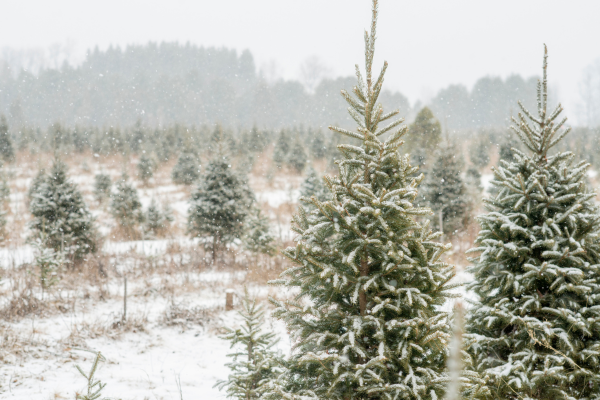Why choose a real Christmas tree?
A survey commissioned by the British Christmas Tree Growers Association found that 8 million real trees were sold in the lead up to Christmas 2021, with responses confirming the main reasons for getting a real Christmas tree as the smell and tradition.
Of course, there’s more than just the sweet scent of pine, spruce or fir to motivate your choice. According to the Carbon Trust, an artificial tree must be used over multiple years (7-20 times depending on the weight and different materials in the tree) in order for it to prove better for the environment than buying a new, commercially grown tree every year.
Research also shows that the average 6ft Christmas tree, which takes approximately 10 years to grow, attracts a wealth of wildlife during its growing cycle, including up to 40 different types of birds.

Can Christmas trees be FSC certified?
If you’re familiar with the FSC tick-tree logo, it may well be your go-to for assurance that forest products have been responsibly sourced. And if that’s the case, you’re not alone. At this time of year FSC UK receives enquiries from organisations and the public regarding FSC-certified Christmas trees and where to buy them.
The FSC forest management standard for the UK has some pretty specific requirements about Christmas trees. These requirements prohibit the certification of Christmas trees grown as a horticultural or nursery crop, meaning that for many UK-grown trees, this certification isn’t an option.
Examples of Christmas trees which may be covered by an FSC certificate include:
- Trees (<4m in height) grown on areas within the woodland matrix used solely for Christmas tree production
- Thinnings/tops from forest tree crops
- Trees grown by interplanting of forest tree crops
- Mature trees (>4m in height)
As mature trees (>4m in height) are acceptable, and generally harvested from a forest rather than as part of a horticultural crop, you’re likely to spot an FSC tree in your town or city centre!
Where to buy responsibly sourced Christmas trees
This year, you can buy FSC-certified Christmas trees which have been grown in the UK from some Forest and Land Scotland sites and some Forestry England sites (note: only Forestry England's Norway Spruce Christmas trees are FSC-certified).
If you're not based near any of these sites and you want a real responsibly sourced tree, the Soil Association recommend sourcing from an organic independent retailer or farm shop, as these providers are more likely to opt for growers who totally avoid pesticides on their farms. You could look to source your tree from Magic of Foresters, the UK's first organic Christmas tree nursery.
The closer your tree was grown to your home, the lower its carbon footprint is likely to be. Grown in Britain actively encourages consumers and retailers to choose certified British-grown Christmas trees. Their scheme certifies that Christmas trees are fresh and UK-grown. The British Christmas Tree Growers Association represents and support growers and their “kite mark” gives consumers confidence that they have bought a quality, local Christmas tree.
Whichever tree you choose, make sure to dispose of it responsibly. Your council, or another local organisation, may offer a chipping service, or you may have room to let the tree rot or to burn it in your garden. The main thing is to try to ensure it doesn’t end up in landfill, where it will decompose but release methane gas. You could also opt for a tree with roots so you can replant it in your garden to use each year.

